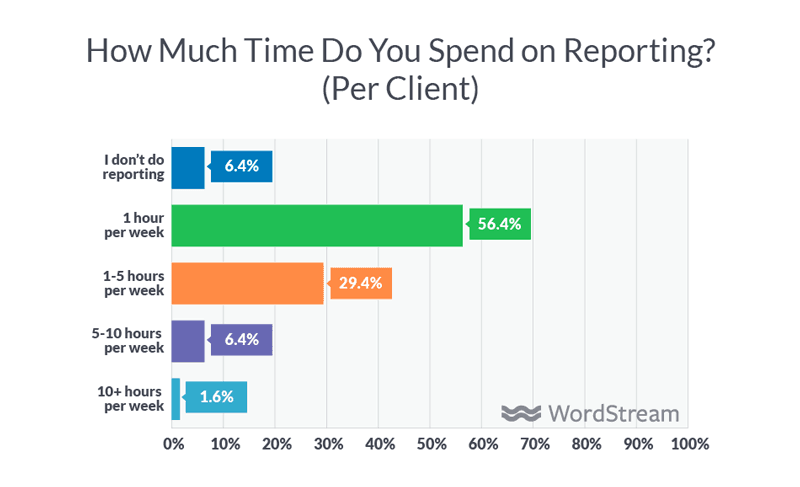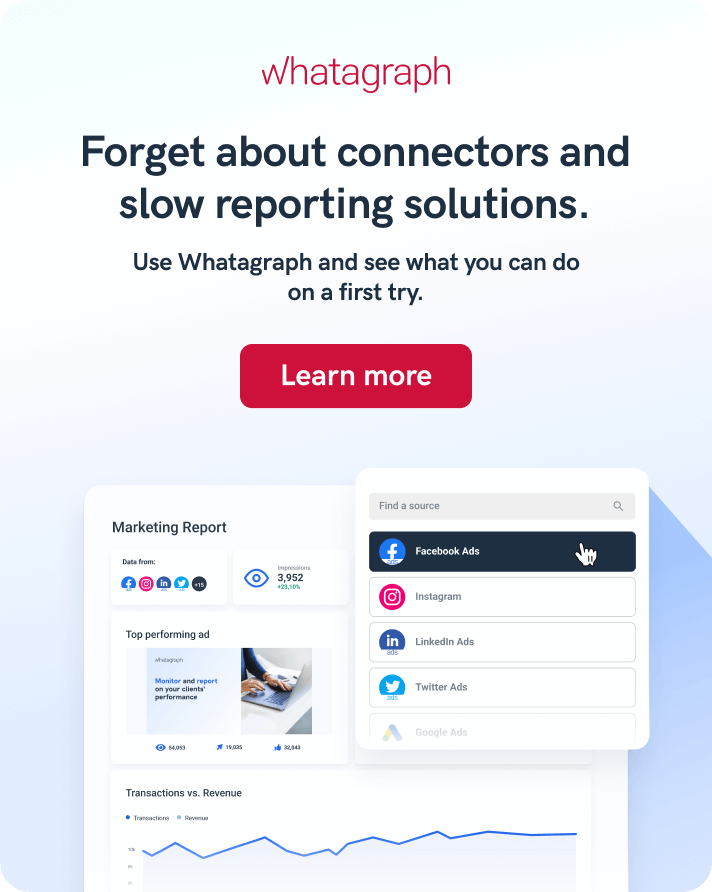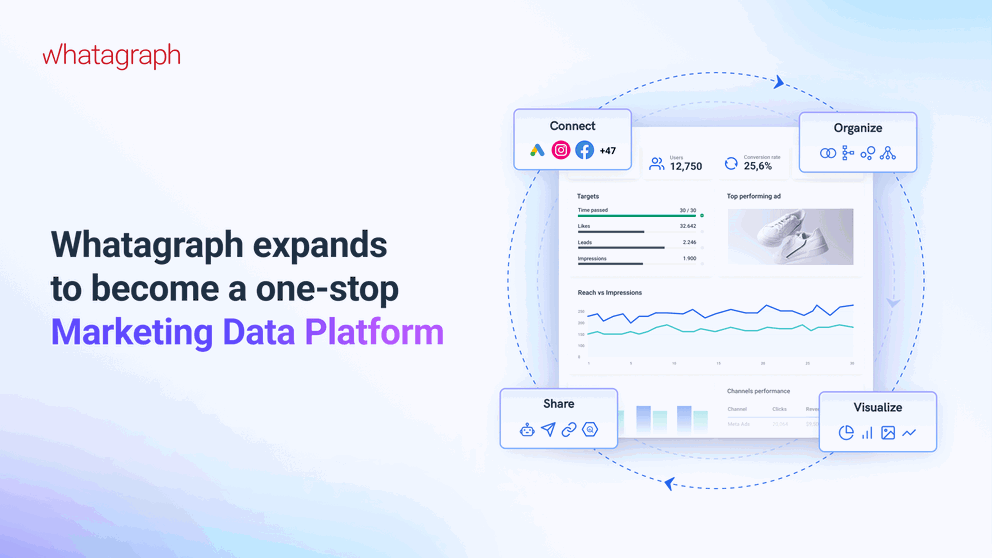Client-agency relationships can be challenging. Sometimes they work beautifully, and sometimes... Well, everyone’s heard agency horror stories. And client horror stories, too. While it may be difficult to pinpoint the exact motives why a certain client chooses to fire a certain ad agency, here are some of the most common reasons.
6 Reasons Why Clients and Ad Agencies Split

Sep 16 2019 ● 6 min read

Table of Contents
- Reason #1: The agency doesn't give access to the accounts they manage.
- Reason #2: The agency shares client data or marketing strategy with a third-party.
- Reason #3: The agency won’t tell the client what they’re doing.
- Reason #4: The agency doesn’t have any tracking or goal conversions set up.
- Reason #5: The agency “doesn’t do reporting.”
- Reason #6: The agency isn’t responsive.
- Closing thoughts
Splitting ways is a complex decision on both ends. There are several important aspects to be taken into account on the client-side:
- You have to balance the benefits of finding a better agency against the significant time, effort, and risk it's going to take.
- Even if a replacement agency looks good, once you’ve been working with them for a while, you will probably find flaws you can’t see right now.
- Consider the investments you’ve made with your agency partner. Your staff knows their staff. They know your brand guidelines, your workflow – all the intricacies of what you need and like.
- Your client agreement may be grandfathered into some pay structures you’d rather not renegotiate at higher, current market rate prices.
From the agency perspective, revenue loss is the obvious downside, but so is damaged reputation. If you have the resources to figure out what clients actually want from your agency, and if your client is willing to collaborate, have a serious heart-to-heart talk.
Identify the aspects that cause most friction and agree on specific, trackable outcomes that need to be met if the relationship is going to continue (the below chart by HubSpot might help).
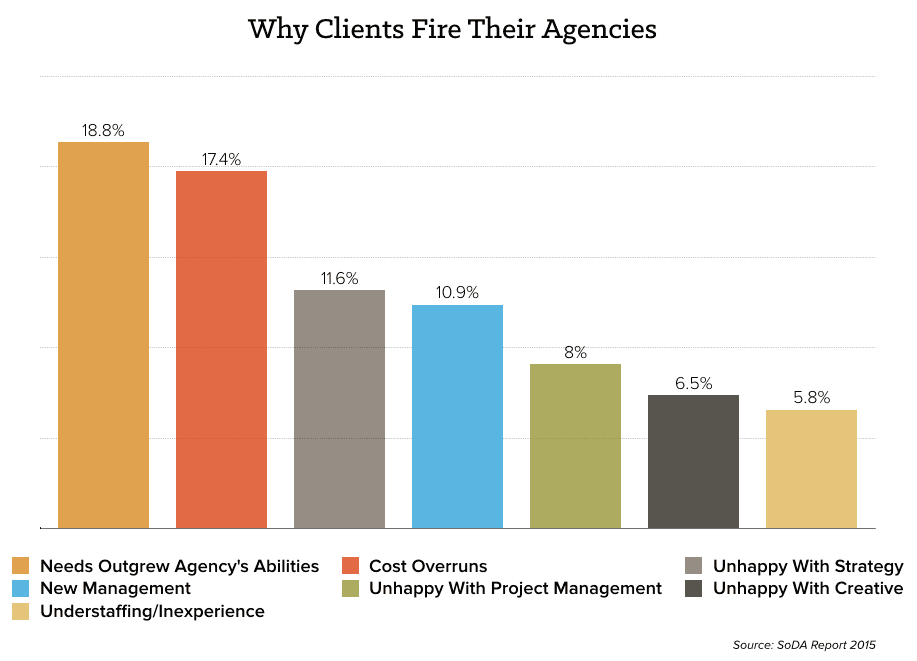
Unfortunately, sometimes it can be difficult to look past the frustration and pinpoint the broken link. The points below should give business owners and agency workers some helpful perspective on why clients choose to fire their agencies.
Reason #1: The agency doesn't give access to the accounts they manage.
There is no excuse for this. Ever. Whether it’s Facebook or Google Ads, those accounts belong to the client and should be rightfully accessible to them. If you're on the client-side and you're facing this issue, you might want to consult an attorney first and see what legal steps you can take to regain access to your accounts.
And don’t let your agency tell you the account can’t be moved. It is possible to export every campaign, ad set or ad group from Google Ads or Facebook Ads Manager accounts. Most other major platforms and tools have similar functionality. In a worst-case scenario, you may want to just get all the raw assets from your old account.
If you're an agency worker, make sure you don't make the mistake of creating client’s campaigns within your own account. What you should do instead is add your account to their Manager Accounts (previously known as “My Client Center” or “MCC”).
Reason #2: The agency shares client data or marketing strategy with a third-party.
It’s hard to believe we even have to mention this, but a company’s information, including marketing strategy, customer lists, internal issues – all of it – must be confidential. Yet, this doesn't stop agencies from sharing this type of information.
To protect your firm, ask an attorney familiar with your business to draft a non-disclosure agreement (NDA). Have every agency, third-party, and freelancer you work with sign it. This will immediately send a signal that you know how to protect your business. And, should they still do something terrible, you now have stronger legal ground to sue the pants off them.
If you're on the agency side, ask your client about signing an NDA. Then tell them about the steps you will take to protect their company’s data. Now that GDPR is in place, it's an important topic, which also shows your agency is transparent and can be trusted.
Reason #3: The agency won’t tell the client what they’re doing.
Oh boy… Doesn’t this just wave a billboard-sized red flag? If an agency can't give proof, documentation, and thorough explanations of what they’re doing and why they’re doing it, it's the best reason for clients to run.
There are thousands of stories of terrible SEO agencies getting sites de-indexed. And now that marketers have to work within the rules of GDPR, a bad agency could potentially even bankrupt your firm.
If you're on the agency side and see that your client doesn’t understand some of the marketing tactics your agency is using, help them! Find someone trustworthy (may even be an independent IT consultant) who can explain those tactics in human language and assure you know how to track their performance onwards.
Reason #4: The agency doesn’t have any tracking or goal conversions set up.
Marketing without tracking wastes money. Of course, some people call marketing without tracking “brand marketing,” but even brand marketing can be tracked to a certain extent.
If you’re doing almost any kind of digital marketing – PPC, SEO, content marketing, social media marketing, email marketing, influencer marketing, etc. – it can be tracked. And even if you think your marketing might be doing well even without tracking, consider how well it would do it if you could actually know which individual tactics and campaigns generated a positive return on investment?
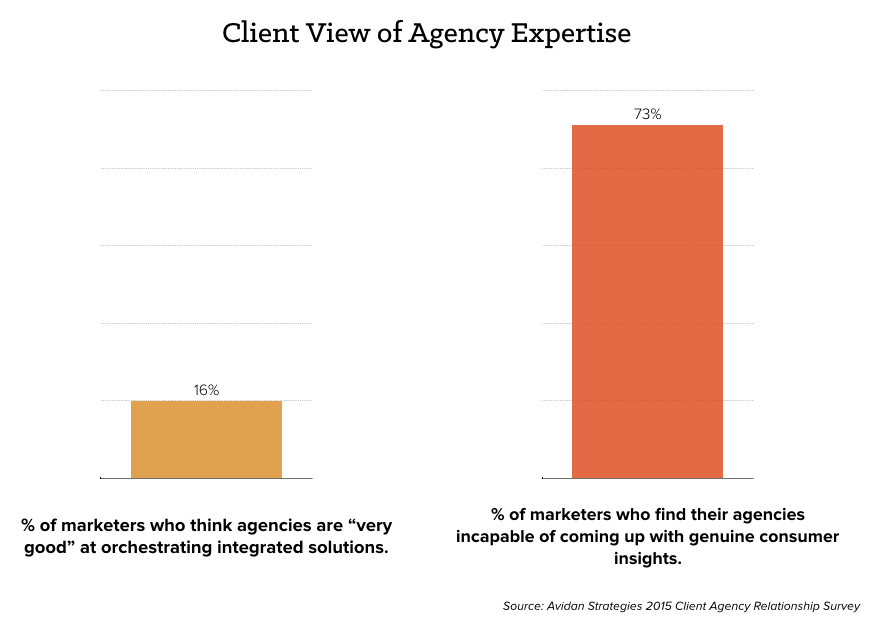
The other inexcusable thing about not tracking marketing campaigns is that it’s not all that hard to do. It’s not all that expensive, either. Free tools like Google Analytics can work wonders, and if you add in even the cost of a good reporting package, you’re still looking at a very modest sum.
Reason #5: The agency “doesn’t do reporting.”
This is nearly as bad as #3 on our list, and here's why. Without reporting, it’s extremely hard to tell if your marketing investment is paying off. This brings up another common problem with reporting and measurement: Tracking vanity metrics. If an agency can’t or won’t go beyond clicks and likes for KPIs, you gotta go.
Lack of reporting is particularly frustrating because it's not that hard. It doesn’t have to take much time. The chart below shows how much time agencies spend on reporting. You can cut that time down to a half with a good marketing analytics tool that will let you automate all your reporting work.
As an agency worker, you'll see you only need to set up the report once, and then schedule it to go out to different people on your team at chosen intervals. It's also super easy to create custom reports for different scenarios, like a high-level report for the CMO of the company and a more in-depth report for the community manager.
Reason #6: The agency isn’t responsive.
This can be as simple as responding to calls and emails. If an agency can’t answer calls and emails in 48 hours or less, how can a client believe they care about their business – or that they can manage multiple accounts and campaigns well?
But phone calls and emails are only the first level of this. An agency also needs to be willing to change tactics or strategy when a client asks them to. If they refuse, or they say they’ll change but then they don’t… well, that should make the decision to leave them pretty clear.
Closing thoughts
The relationship between an agency and a client is a two-way street. None of these points should be taken as strict criticism to agencies, rather indications of what clients expect and aren't always getting in return. And as for clients, don't expect your agency to be mindreaders – even the sourest relationships can be salvaged when you sit down and talk.
Published on Sep 16 2019

WRITTEN BY
Pam NeelyPam is an award-winning freelance content writer with expertise in SaaS, MarTech, and small business marketing companies. A business book ghostwriter in her free time, Pam always writes from a B2B owner perspective.
Get marketing insights direct to your inbox
By submitting this form, you agree to our privacy policy
